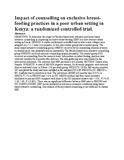| dc.contributor.author | Ochola, SA | |
| dc.contributor.author | Labadarios, D | |
| dc.contributor.author | Nduati, RW | |
| dc.date.accessioned | 2013-04-29T07:31:48Z | |
| dc.date.available | 2013-04-29T07:31:48Z | |
| dc.date.issued | 2012-10 | |
| dc.identifier.citation | Public Health Nutrition. 2012:1-8 | en |
| dc.identifier.uri | http://www.ncbi.nlm.nih.gov/pubmed/23039968 | |
| dc.identifier.uri | http://erepository.uonbi.ac.ke:8080/xmlui/handle/123456789/17446 | |
| dc.description | Journal article | en |
| dc.description.abstract | OBJECTIVE:
To determine the impact of facility-based semi-intensive and home-based intensive counselling in improving exclusive breast-feeding (EBF) in a low-resource urban setting in Kenya.
DESIGN:
A cluster randomized controlled trial in which nine villages were assigned on a 1:1:1 ratio, by computer, to two intervention groups and a control group. The home-based intensive counselling group (HBICG) received seven counselling sessions at home by trained peers, one prenatally and six postnatally. The facility-based semi-intensive counselling group (FBSICG) received only one counselling session prenatally. The control group (CG) received no counselling from the research team. Information on infant feeding practices was collected monthly for 6 months after delivery. The data-gathering team was blinded to the intervention allocation. The outcome was EBF prevalence at 6 months.
SETTING:
Kibera slum, Nairobi.
SUBJECTS:
A total of 360 HIV-negative women, 34-36 weeks pregnant, were selected from an antenatal clinic in Kibera; 120 per study group.
RESULTS:
Of the 360 women enrolled, 265 completed the study and were included in the analysis (CG n 89; FBSICG n 87; HBICG n 89). Analysis was by intention to treat. The prevalence of EBF at 6 months was 23·6 % in HBICG, 9·2 % in FBSICG and 5·6 % in CG. HBICG mothers had four times increased likelihood to practise EBF compared with those in the CG (adjusted relative risk = 4·01; 95 % CI 2·30, 7·01; P = 0·001). There was no significant difference between EBF rates in FBSICG and CG.
CONCLUSIONS:
EBF can be promoted in low socio-economic conditions using home-based intensive counselling. One session of facility-based counselling is not sufficient to sustain EBF. | en |
| dc.language.iso | en | en |
| dc.subject | Counselling | en |
| dc.subject | Exclusive breast-feeding practices | en |
| dc.subject | Poor urban setting | en |
| dc.subject | Randomized controlled trial. | en |
| dc.subject | Kenya | en |
| dc.title | Impact of counselling on exclusive breast-feeding practices in a poor urban setting in Kenya: a randomized controlled trial. | en |
| dc.type | Article | en |
| local.publisher | Department of paediatrics, University of Nairobi | en |

